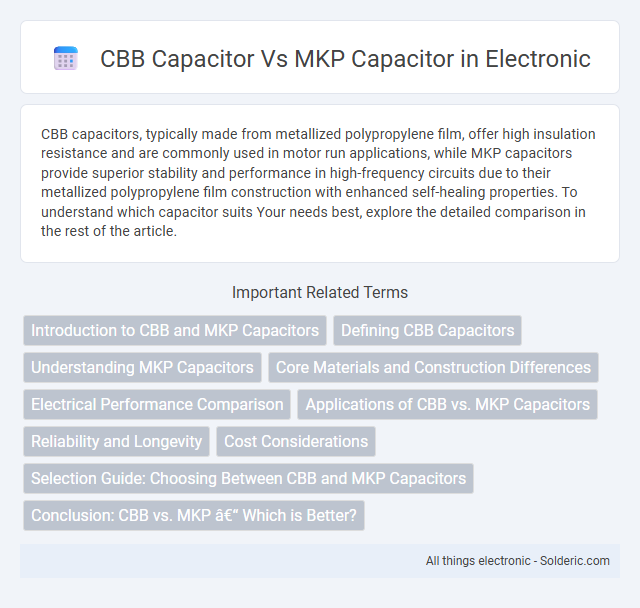CBB capacitors, typically made from metallized polypropylene film, offer high insulation resistance and are commonly used in motor run applications, while MKP capacitors provide superior stability and performance in high-frequency circuits due to their metallized polypropylene film construction with enhanced self-healing properties. To understand which capacitor suits Your needs best, explore the detailed comparison in the rest of the article.
Comparison Table
| Feature | CBB Capacitor | MKP Capacitor |
|---|---|---|
| Dielectric Material | Polypropylene Film | Metallized Polypropylene Film |
| Capacitance Range | 0.001 uF to 40 uF | 0.001 uF to 50 uF |
| Voltage Rating | 250V to 630V AC/DC | 250V to 1100V AC/DC |
| ESR (Equivalent Series Resistance) | Moderate | Low |
| Temperature Range | -40degC to 85degC | -55degC to 105degC |
| Application | General electronic circuits, motor run applications | High precision electronics, interference suppression, power factor correction |
| Self-Healing Property | No | Yes |
| Size | Larger for similar capacitance | Compact and lightweight |
| Cost | Lower | Higher |
Introduction to CBB and MKP Capacitors
CBB capacitors, commonly known as metallized polypropylene film capacitors, are widely used for their excellent electrical characteristics and reliability in AC motor run applications. MKP capacitors, or metallized polypropylene capacitors, offer superior stability, low dissipation factor, and high self-healing properties, making them ideal for precision electronic circuits and filtering tasks. Choosing between CBB and MKP capacitors depends on your project's requirements for capacitance tolerance, temperature stability, and life expectancy.
Defining CBB Capacitors
CBB capacitors, commonly known as metallized polypropylene film capacitors, are widely used for their high insulation resistance, low dielectric loss, and excellent self-healing properties. These capacitors feature a polypropylene film dielectric, which ensures stable electrical characteristics, high breakdown voltage, and long operational lifespan even under high-frequency and high-temperature conditions. Their robust design makes them ideal for applications in motor run circuits, power factor correction, and noise suppression.
Understanding MKP Capacitors
MKP capacitors, made from metallized polypropylene film, offer superior electrical stability, low dielectric absorption, and higher temperature tolerance compared to CBB capacitors, which typically use polyester film. These characteristics make MKP capacitors ideal for precision applications like audio equipment, power factor correction, and high-frequency circuits. While CBB capacitors are more cost-effective for general-purpose use, MKP capacitors provide enhanced reliability and performance in demanding environments.
Core Materials and Construction Differences
CBB capacitors use metallized polypropylene film as the dielectric, offering high insulation resistance and low dielectric absorption, while MKP capacitors employ metallized polypropylene film with a polypropylene-based core for enhanced thermal stability and self-healing properties. The construction of CBB capacitors typically features a wound film design with metalized layers that provide good capacitance stability and voltage tolerance, whereas MKP capacitors incorporate a metallized polypropylene film combining high breakdown voltage and long service life. Core material differences result in MKP capacitors having superior performance in high-frequency and high-temperature applications compared to standard CBB capacitors.
Electrical Performance Comparison
CBB capacitors typically offer high capacitance values with stable performance at low frequencies, making them suitable for general-purpose AC applications and motor run circuits. MKP capacitors provide superior electrical performance with lower dielectric losses, higher insulation resistance, and excellent stability over a wide frequency range, ideal for high-frequency filtering and precise electronic circuits. Your choice depends on prioritizing either cost-effective, robust solutions (CBB) or enhanced efficiency with long-term reliability (MKP).
Applications of CBB vs. MKP Capacitors
CBB capacitors are widely used in AC motor run circuits, lighting ballasts, and EMI/RFI suppression due to their high capacitance stability and cost-effectiveness. MKP capacitors, with superior dielectric properties and lower losses, are preferred in high-frequency applications such as power factor correction, audio crossover networks, and precision filtering. The electrical performance and durability differences make CBB capacitors suitable for general industrial uses, while MKP capacitors excel in demanding environments requiring high reliability and low dissipation factor.
Reliability and Longevity
CBB capacitors, often used in AC motor applications, offer good reliability under moderate temperature and voltage conditions but may degrade faster due to electrolyte evaporation and aging effects. MKP capacitors provide superior longevity and reliability with lower dielectric losses, higher insulation resistance, and excellent stability over time, making them ideal for high-frequency and precision electronic circuits. Your choice between CBB and MKP capacitors should consider the operating environment and required lifespan, as MKP capacitors generally ensure better performance in demanding applications.
Cost Considerations
CBB capacitors typically offer a lower cost solution compared to MKP capacitors, making them ideal for budget-sensitive applications. MKP capacitors generally provide superior performance and higher reliability, which justifies their higher price in critical or high-frequency circuits. Your choice should balance cost considerations with the required electrical characteristics and longevity for the specific application.
Selection Guide: Choosing Between CBB and MKP Capacitors
CBB capacitors, known for their polyester film dielectric, offer good stability and cost-effectiveness, making them ideal for general-purpose applications such as motor run circuits and audio equipment. MKP capacitors utilize metallized polypropylene film, providing superior insulation resistance, lower dissipation factor, and excellent performance under high-frequency or high-voltage conditions, which suits precision electronic circuits and power factor correction. When selecting between CBB and MKP capacitors, consider your specific application requirements, including voltage rating, frequency response, thermal stability, and budget constraints to ensure optimal performance and reliability.
Conclusion: CBB vs. MKP – Which is Better?
CBB capacitors, made from metallized polypropylene film, offer good stability and cost-effectiveness, making them suitable for general-purpose applications. MKP capacitors, featuring metallized polypropylene with a polyphenylene dielectric, provide superior high-frequency performance, lower dissipation factor, and longer lifespan, ideal for precision electronics and demanding environments. For applications requiring enhanced reliability and electrical characteristics, MKP capacitors are generally better, while CBB capacitors serve well for budget-friendly, less critical uses.
CBB capacitor vs MKP capacitor Infographic

 solderic.com
solderic.com